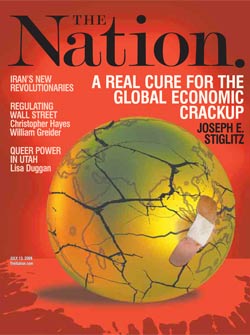 Alex Cockburn rages at the Americans who cheerlead for the protests in Iran while they ignore politics in their own country, giving the Obama administration carte blanche to break every promise Mr O made to help working people and curb the national security state. As for Cockburn’s view of Iran, readers of his newsletter Counterpunch are familiar with his suspicion that the protests are something of a phony put up by advocates of war.
Alex Cockburn rages at the Americans who cheerlead for the protests in Iran while they ignore politics in their own country, giving the Obama administration carte blanche to break every promise Mr O made to help working people and curb the national security state. As for Cockburn’s view of Iran, readers of his newsletter Counterpunch are familiar with his suspicion that the protests are something of a phony put up by advocates of war.
An editorial about the Obama administration’s approach to the righs of sexual minorities begins by pointing out that in Mr O’s first bid for public office, for the Illinois state senate in 1996, he was asked where he stood on same-sex marriage. Unlike other candidates, who either checked “yes” or “no,” Mr O went out of his way to add the sentence ”I favor legalizing same-sex marriages, and would fight efforts to prohibit such marriages.” At that time no state recognized same-sex marriages, and many criminalized same-sex sex. Now, the country has moved on. Even the governor of Utah has endorsed civil unions for same sex couples. And Mr O has moved backward. Now he opposes same-sex marriages, presides over the continuation of “don’t ask- don’t tell,” and hasn’t lifted a finger to support legislation to protect sexual minorities from workplace discrimination, legislation 89% of Americans say they favor. The editorial sums it up: “At this rate, Obama is in danger of being outpaced on gay rights not just by the American people but by the nonsuicidal wing of the Republican Party.”
Lisa Duggan celebrates Salt Lake City’s surprisingly visible, surprisingly politicized sexual minorities. Countering those who have called for a boycott of Utah to protest the role of Mormons in the campaign to end gender-neutral marriage in California, Duggan quotes Salt Lake City residents who’ve called for a “New Queer Pioneer Movement,” one that would emulate the sect trains of the Mormon nineteenth century and flood the state with same-sexers.
Joseph Stiglitz claims that the current global economic crisis presents us with a stark alternative: either we adopt nationalistic policies of subsidy and protection that mean we renounce economic globalization, or we adopt United Nations-based regulatory schemes that mean we embrace political globalization. As Stiglitz is the head of the UN’s Commission of Experts on the crisis, it will not come as a complete surprise that he favors the latter option.
Stuart Klawans reviews a new documentary about Afghan Star, the Kabul-based talent show based on American Idol. Klawans writes: “There is even a message: that the showbiz cheesiness we Americans might deride can be a source of hope for people literally dying to sing.” I try not to deride American Idol too much, even after my wife’s aunt once dragooned me into spending two hours of my life watching the show. But I do hope that the Afghans are dying for something bigger than American Idol.
Katha Pollitt is disappointed that Mr O’s Cairo speech didn’t give more recognition to women’s struggle for equality in the Muslim world. She’s also concerned that too many people use phrases like “the Muslim world” to refer to an extremely large and diverse segment of the human race. And she’s quite sure that Nicolas Sarkozy’s move to ban the burqa and niqab is precisely the wrong way to go about promoting women’s rights:
The current election struggle in Iran came as a big surprise to those who take the simplistic view of Muslim nations as our antagonists in a clash of civilizations. Who knew that our arch-enemy, member in good standing of the Axis of Evil, had all these hip young people, these tech-savvy Tweeters, these ordinary citizens eager to go into the streets day after day and risk beatings, arrests and death at the hands of the feared Basij? Who knew it had so many women who, however devout they may or may not be, don’t want to be denied ordinary human freedoms in the name of religion, thank you very much? The energetic and massive participation of women in the street demonstrations has received much comment in the Western media, but it’s only surprising if you think Muslim women really are as weak and passive as the mullahs imagine.
That impression of Muslim women appears to be shared by Nicolas Sarkozy, who has thrown his support behind a proposal to ban in France the all-enveloping burqa and the niqab, calling it a “question of women’s liberty and dignity.” The most vocal French feminists support the ban, as does the French Muslim women’s group Ni Putes Ni Soumises (Neither Whores nor Doormats), for whom it’s a necessary counterweight to family and community pressures on women. While it may well be true that some of the small number of French women who wear burqas and niqabs are forced into them, it’s hard to see how a ban will help liberate them. Instead, it will permit the French to publicly humiliate them and feel good about it, ratify the Islamists’ claim that the West is out to get Islam and give more proof that Muslims are unwelcome in France.
The web edition includes a note about South Carolina’s Governor Mark Sanford, whose tearful confession of adultery capped a rather strange story this week. I’d say Sanford is the best governor South Carolina could possibly have at this point in its history, and I grant you that isn’t saying much. So I’m disappointed in him.
No comments:
Post a Comment